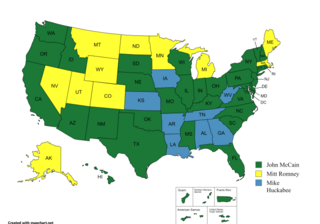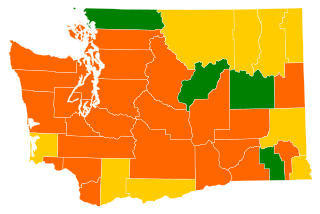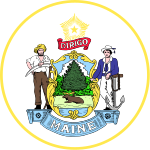
Each of the 50 U.S. states, the District of Columbia, and territories of the United States holds either primary elections or caucuses to help nominate individual candidates for president of the United States. This process is designed to choose the candidates that will represent their political parties in the general election.

The Iowa caucuses are quadrennial electoral events for the Democratic and Republican parties in the U.S. state of Iowa. Unlike primary elections, where registered voters cast ballots at polling places on election day, Iowa caucuses are meetings where voters gather to discuss and select candidates for their registered party. Political parties hold the caucuses, in contrast to most state-run primaries. Both presidential and midterm elections in Iowa use caucuses. The caucuses are also held to select delegates to county conventions and party committees, among other party activities.

The 2008 Iowa Republican presidential caucuses took place on January 3, 2008. The Iowa Republican caucuses are an unofficial primary, with the delegates to the state convention selected proportionally via a straw poll. The Iowa caucuses mark the traditional formal start of the delegate selection process for the 2008 United States presidential election.

From January 3 to June 3, 2008, voters of the Republican Party chose their nominee for president in the 2008 United States presidential election. Senator John McCain of Arizona was selected as the nominee through a series of primary elections and caucuses culminating in the 2008 Republican National Convention held from Monday, September 1, through Thursday, September 4, 2008, in Saint Paul, Minnesota. President George W. Bush was ineligible to be elected to a third term due to the term limits established by the 22nd Amendment.
Statewide public opinion polls conducted relating to the 2008 Republican Party presidential primaries, typically using standard statistical methodology, include:

This article contains the results of the 2008 Republican presidential primaries and caucuses.

The 2008 United States presidential election in Iowa took place on November 4, 2008, as part of the 2008 United States presidential election. Voters chose seven representatives, or electors to the Electoral College, who voted for president and vice president.

The 2008 Nevada Republican presidential caucuses was held on January 19, the same day as the 2008 South Carolina Republican primary, with 31 delegates at stake. Mitt Romney was the winner in Nevada with 51% of the votes, with Ron Paul in second place. Half of Romney's votes came from Mormons, while two-thirds of the independent voters favored Paul. According to the Las Vegas Sun, Republicans crossed over in large numbers to vote Democratic; CNN exit polls indicated that Republican voters made up 4% of the Democratic caucus turnout.

The Nevada presidential caucuses are an electoral event in which citizens met in precinct caucuses to elect delegates to the corresponding county conventions. In 2021, Harry Reid passed legislation (AB321) to include primaries in hopes of increasing voter turn-out. Nevada has for decades and still does have a caucus. The caucus is where the delegates receive the votes that will be carried to the National Convention and not the primaries. There are 17 counties in Nevada and the state has 26 delegates. The Nevada caucuses began in 1981. The Kerry/Dean caucus was held on February 14, 2004. In 2008 the DNC gave Nevada the official first in the west status reflecting the growing importance of the West as well as Nevada's electoral bellwether status. The 2008 Nevada caucuses were the third major electoral event in the nominating process for President of the United States. In 2016, the Democratic caucus was held on February 20 and the Republican caucus was held on February 23.

The 2008 Louisiana Republican presidential caucuses were held on January 22 and the primary on February 9, 2008.

The 2008 Minnesota Democratic presidential caucuses took place on Super Tuesday, February 5, 2008 with 78 delegates at stake. The winner in each of Minnesota's eight congressional districts was awarded all of that district's delegates, totaling 47. Another 25 delegates were awarded to the statewide winner, Barack Obama. The 72 delegates represented Minnesota at the Democratic National Convention in Denver, Colorado. Sixteen other unpledged delegates, known as superdelegates, also attended the convention and cast their votes as well.

Voters of the Republican Party elected state delegations to the 2012 Republican National Convention in presidential primaries. The national convention then selected its nominee to run for President of the United States in the 2012 presidential election. There were 2,286 delegates chosen, and a candidate needed to accumulate 1,144 delegate votes at the convention to win the nomination. The caucuses allocated delegates to the respective state delegations to the national convention, but the actual election of the delegates were, many times, at a later date. Delegates were elected in different ways that vary from state to state. They could be elected at local conventions, selected from slates submitted by the candidates, selected at committee meetings, or elected directly at the caucuses and primaries.

The 2012 United States presidential election in Iowa took place on November 6, 2012, as part of the 2012 United States presidential election in which all 50 states plus the District of Columbia participated. Iowa voters chose six electors to represent them in the Electoral College via a popular vote pitting incumbent Democratic President Barack Obama and his running mate, Vice President Joe Biden, against Republican challenger and former Massachusetts Governor Mitt Romney and his running mate, Congressman Paul Ryan.

The 2012 United States presidential election in Nevada took place on November 6, 2012, as part of the 2012 United States presidential election in which all 50 states plus the District of Columbia participated. State voters chose six electors to represent them in the Electoral College via a popular vote pitting incumbent Democratic President Barack Obama and his running mate, Vice President Joe Biden, against Republican challenger and former Massachusetts Governor Mitt Romney and his running mate, Congressman Paul Ryan.

This article contains the results of the 2012 Republican presidential primaries and caucuses, which resulted in the nomination of Mitt Romney as the Republican nominee for President of the United States. The 2012 Republican primaries were the selection processes by which the Republican Party selected delegates to attend the 2012 Republican National Convention from August 27–30. The series of primaries, caucuses, and state conventions culminated in the national convention, where the delegates cast their votes to formally select a candidate. A simple majority (1,144) of the total delegate votes (2,286) was required to become the party's nominee.

The 2012 United States presidential election in Arizona took place on November 6, 2012, as part of the 2012 United States presidential election in which all 50 states plus the District of Columbia participated. State voters chose 11 electors to represent them in the Electoral College via a popular vote pitting incumbent Democratic President Barack Obama and his running mate, Vice President Joe Biden, against Republican challenger and former Massachusetts Governor Mitt Romney and his running mate, Congressman Paul Ryan. Prior to the election, all 17 news organizations considered this a state Romney would win, or otherwise considered as a safe red state. Arizona was won by Romney with a 9.06% margin. This is the most recent presidential election in which Arizona failed to back the national winner. Obama remains the only president to win two terms in office without carrying Arizona either time since the state's founding in 1912. Arizona is also one of only two states that Obama lost in 2008 & 2012 that his vice president Joe Biden would go on to win in 2020, the other being Georgia. This also remains the most recent election where Arizona voted to the right of Georgia, Iowa, Ohio, and North Carolina.

The 2012 United States presidential election in Missouri took place on November 6, 2012, as part of the 2012 United States presidential election, in which all 50 states plus the District of Columbia participated. Missouri voters chose 10 electors to represent them in the Electoral College via a popular vote pitting incumbent Democratic President Barack Obama and his running mate, Vice President Joe Biden, against Republican challenger and former Massachusetts Governor Mitt Romney and his running mate, Congressman Paul Ryan.

The 2008 United States presidential election in New Hampshire took place on November 4, 2008, as part of the 2008 United States presidential election throughout all 50 states and D.C. Voters chose four representatives, or electors to the Electoral College, who voted for president and vice president.

The 2012 Washington Republican presidential caucuses were held on March 3, 2012. Since 1992, the Washington Republicans have used a presidential preferential primary in addition to the caucuses. The 2012 primary was, however, canceled for budgetary reasons, as was the one in 2004.

The 2012 Maine Republican presidential caucuses were held between Sunday, January 29, and Saturday, March 3, at various locations throughout the state of Maine. Presidential preference polls were held at the caucuses, but those polls were not binding on the choices of delegates to the Maine Republican Party convention. The caucuses chose delegates in processes separate from the straw polling.






















